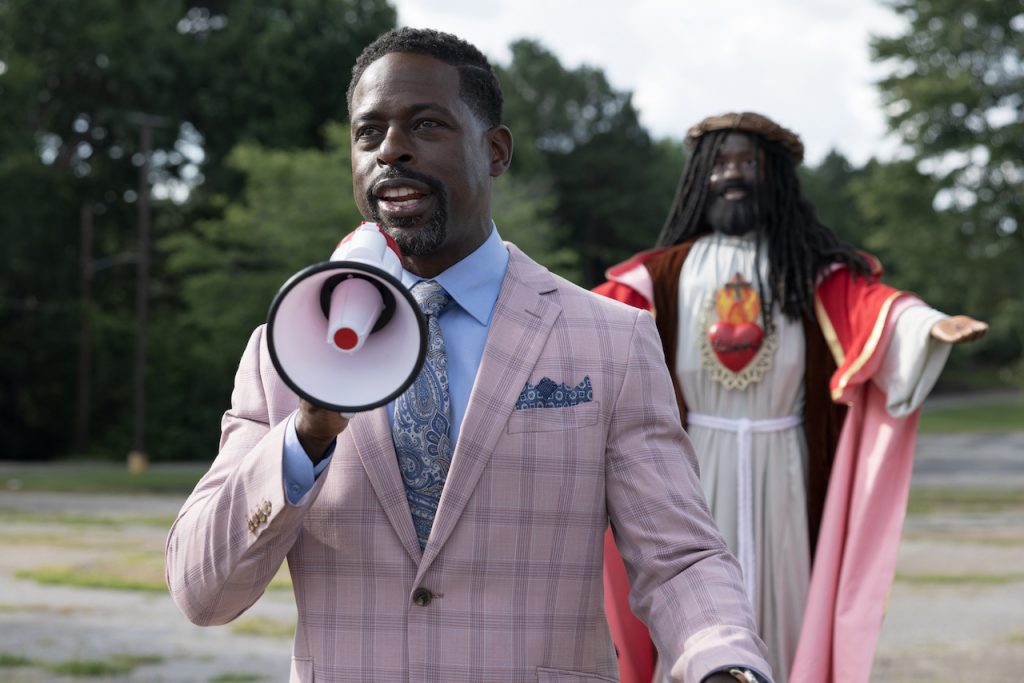Identical twin sisters Adamma and Adanne Ebo were raised in a Southern Baptist community in Georgia. Although they both believe in the spirit of their church, there were certain aspects of their faith that pushed it into “commodified” and “organized” religion. That experience made them uncomfortable and sparked the idea for Honk For Jesus, a biting satirical look into the fictitious Wander To Greater Paths megachurch in Atlanta, Georgia. It stars celebrity couple and prosperity doctrine devotees, Trinitie (Regina Hall) and Lee-Curtis Childs (Sterling K. Brown), because there’s something special about “Pastors In Prada.” The Ebo sisters spoke to Creative Screenwriting Magazine to discuss their views on how religion has lost its way without losing theirs.
“Megachurches are distinct from regular churches in scope and scale,” said Adanne. “Everything is bigger. The building is bigger. The congregation is bigger. The choir is bigger. The performative nature can be bigger and more grandiose,” she elaborated. Most importantly, the bigger a church, the bigger its standing in the community. Size does indeed matter.
We asked the Ebo sisters why people get swept up in megachurch culture which they described as a community within a community. “I see it as people investing in their own lives and ultimately, their own souls,” said Adamma. “They want to be good enough and spiritual enough to make it heaven when all of this is over.” Congregants don’t consider megachurches to be a business or exploitative, they simply want to become better Christians.

Adamma and Adanne Ebo. Photo by Steve Swisher
“If there is an underlying component to the megachurch culture, it relates to missionary work that is a big part of Christianity,” continued Adanne. “People rationalize it as the bigger the church, the bigger the platform to spread the gospel and the word of God.”
Organized Religion vs Spirituality
Although deeply denouncing church scandals and corruption, the Ebo sisters still see a place for them.
“Organized religion is the institutional idea of religious practices, where you’re in a certain time in a certain place, doing specific things with specific people on a regimented schedule,” said Adamme. “Spirituality is more freeform. You take what you learn from organized religion that best serves you and leave the things behind that you don’t love.” People are left free to follow their own personal spiritual life. You organize your own life outside church dictates.
Although the Ebo sisters questioned certain aspects of organized religion during their younger years, their faith is stronger than ever. They don’t need to choose a side to be good Christians. “We still go to church, but don’t have to if we don’t feel like it,” said Adamma.
“The bigger question to us is how we treat our fellow man,” said Adanne. “We found a deeper empathy for people in these institutions.”
Honk For Jesus follows a carefully measured satirical format – a grounded outlandishness, if you will. “We made the distinction between a fly-on-the-wall mockumentary and a faux documentary,” articulated Adanne.” In the former, the cameras are more into the joke and wink to the audience to generate comedy. “We wanted this to feel more like an observational documentary, but also fictitious, so we called it a faux documentary.”
The Ebo sisters opted for this style because “we’re exploring the ideology of truth in Honk For Jesus. What is truth? How can truth the truth get blurred depending on who’s telling what story and when? Documentary storytelling is often taken as a version of the truth,” continued Adamme.
The Lee-Childs & Trinitie Partnership
“They enjoy the fame and the fortune their position has afforded them,” said Adanne. “Ultimately, it’s their partnership and the power that drives them more than their marriage. They are a team and it’s literally ’til death do they part,’ even though I believe they work better as bests friends than a couple. All this while doing God’s work.” The lavish lifestyle simply elevates this work which they would be doing at any rate.
Adamma added, that despite their behaviors, team Trinitie and Lee-Curtis aren’t consciously fleecing their community, but rather “doing what’s necessary. Lee-Curtis truly believes he’s the prophet of God. Trinitie believes in him.” They are receiving the spoils of prosperity through their church. This is a key tenet of the prosperity gospel; their material wealth has been sent by God because they did the hard work.

Lee-Curtis Childs (Sterling K. Brown) Photo by Steve Swisher
The Wander To Greater Paths megachurch was eventually rocked by a sexual scandal due to Lee-Curtis’ indiscretions. They closed down temporarily while they strategized their comeback. Most good comeback stories require a competitor to test their resolve and relevance. Heaven’s House, led by scandal-free pastors Shakura (Nicole Beharie) and Keon (Conphidance) Sumptor have accepted the Childs’ defectors into their welcoming arms filled that role. In a tragic-farcical sequence of events, the Childs plan their comeback on the same day when Heaven’s House is at its fullest giving congregants a choice and a conundrum. This was a key development in later drafts of the screenplay.
“We very intentional to lay the breadcrumbs regarding Lee-Curtis’ indiscretions,” said Adanne. “Unfortunately, sexual scandals are not a foreign concept in churches.”
“We were very specific and subtle when the audience got this information in Honk For Jesus,” added Adamma. “We made it subtle because the scandal is not the point of the film. The point is how, as a community, we can let this happen, and then what will the people do after the scandal. It’s more of an indictment to the rest of us than Lee-Curtis and Trinitie.”
Both Lee-Curtis and Trinitie are deeply ashamed and remorseful of the scandal beyond the loss of their flock. “Trinitie regrets staying married although she decides to. Lee-Curtis regrets not being able to explore his alternative personal life,” commented Adamma. “He regrets the scandal, but he also believes he’s above it and can overcome it,” added Adanne.
The title Honk For Jesus was not a humorous tagline for the movie. “Growing up in the South, it was all tied to amplifying the word of God. It could be a bumper sticker, a sign or a billboard,” reported Adamma. So, honking was all part of being loud and spreading the message. “What happens if you don’t honk?” quipped Adanne. “Are you less of a believer? No, it’s gaslighting!”
We asked the Ebo sisters about the most pivotal and consequential scene in the film. “We really worked on the scene where Lee-Curtis is practising his comeback sermon in front of Trinitie. He talks about not being the perfect man. We had to get the tone of it right especially at that point in the film,” said Adanne. “It had to feel like a real sermon. Lee-Curtis gave many sermons during Honk For Jesus. Many were bombastic, funny and super-engaging.” This sermon had to feel different to illustrate Lee-Curtis’ shame and vulnerability about a part of himself that he can’t change. “This scene also demonstrated how good he is at giving sermons and how people get sucked into the charisma of who he is as a pastor and what happens when you mix that charisma with God. It’s a transfixing experience,” she continued.
Wearing your Sunday best to church takes on new meaning at Wander To Greater Paths and Heaven’s House. “Wearing hats is something you graduate to. It comes with age and seniority,” joked Adamma. “Most of the hats used in the film were our grandmother’s. She had boxes of them.“
